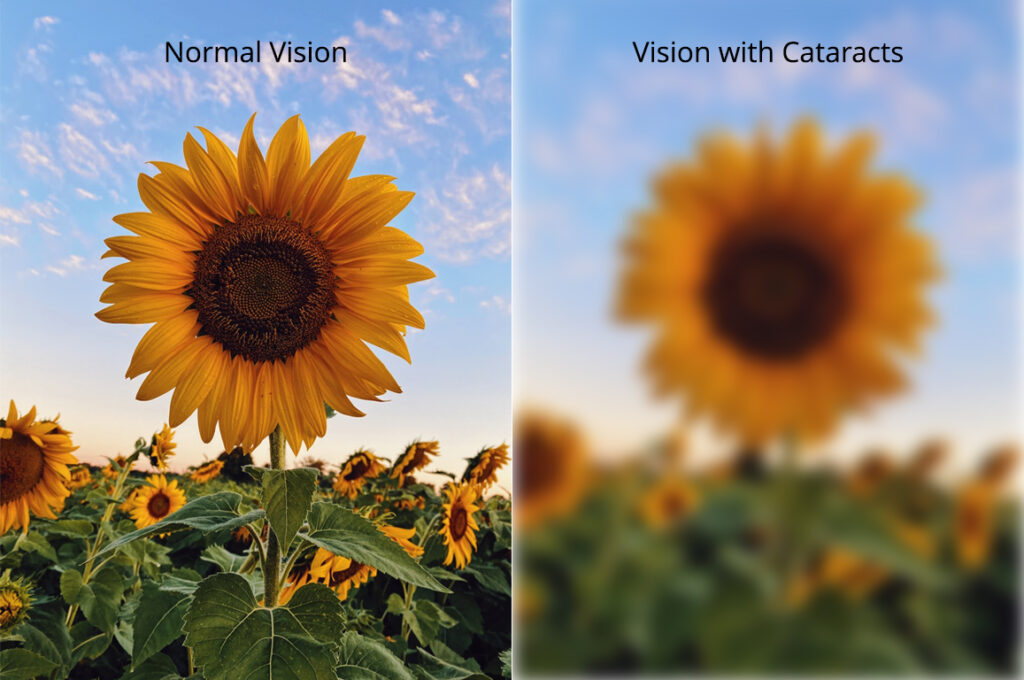How Do I Know If I Have Cataracts?

June is Cataract Awareness Month (with cataracts being one of the leading causes of blindness in the United States) and the importance of early detection and treatment of cataracts is critical to preserving sight. Let's dive into cataracts and how to know if you may be experiencing symptoms of cataracts.
What are Cataracts?
Firstly, what exactly are cataracts? Cataracts occur when the usually clear lens becomes cloudy, impacting your ability to see clearly. Many people with cataracts say that it's like looking through a foggy or dirty window due to their vision getting increasingly worse.
Cataracts are the leading cause of partial vision loss in the United States, and untreated cataracts are the leading cause of blindness worldwide. Cataracts affect more than 24 million Americans over 40, making cataracts one of the most common eye conditions.
How Do Cataracts Develop?
The reason that most people develop cataracts is simple - getting older and aging. As you age, proteins and fibers within the eye break down and clump together, clouding the lenses.
Cataracts most often develop slowly. It can take years or even decades before many people realize they have cataracts. You may not start experiencing any symptoms of vision loss for quite some time.
Vision loss from cataracts only occurs once cataracts have had enough time to develop on the natural lens. You may develop cataracts as early as your forties or fifties without noticeable symptoms. By the age of 75, over half of Americans will have developed cataracts which significantly affect their vision. Many people do not even realize they have cataracts until they begin to experience the increasingly negative symptoms of advanced cataracts.
Other causes of cataracts may include eye injuries or trauma, certain medications, conditions like diabetes and genetic predisposition. While most people with cataracts develop them later in life, some children are also born with cataracts or have them as young adults.
What are the Symptoms of Cataracts?
The most common symptoms of cataracts include the following:
- Clouded, dim, or blurred vision
- Noticing it's more challenging to drive at night or in low light
- Increased sensitivity to bright lights and glare
- Seeing “halos” around lights
- The need for brighter light for reading or other routine activities
- More frequent changes in your glasses or contact lens prescription
- Distortion of vision in either eye
- Fading or yellowing of colors
- A change in the color of the pupil to yellow or milky white
- Seeing things that should be white as muddier in color
If you experience any of these symptoms, schedule an appointment with your eye doctor as soon as possible. The symptoms or signs of cataracts are not exclusive to cataracts, meaning you could have another eye condition.
Can You Prevent Cataracts?
Although leading a healthy lifestyle by eating right and exercising can help reduce your risk of developing cataracts, you can't prevent cataracts. However, you can take measures to lessen your risk of developing early cataracts. The most important preventive measure you can take is having regular eye exams with our experienced eye care team at Gulf Coast Vision Center. During exams, we routinely check for the signs of developing cataracts.
Another measure you can take is learning if you have a family history of cataracts. Having a family history of cataracts increases your chances of developing them. If you're a smoker, it's advised to quit. It's also recommended to eat a healthy diet that includes the daily consumption of berries, fruits, and vegetables, exercise, and wear protective UV eyewear when outside or in environments with artificial UV light. Taking these precautions can help reduce your chances of developing cataracts earlier.
Cataracts are a common eye condition that affects many people as they age. While cataracts can lead to debilitating vision problems, from clouded vision to reduced night vision to complete vision impairment,we're here to help you better understand, manage and treat cataracts.
If you have questions about cataracts or are beginning to experience their frustrating symptoms, contact us at one of our locations today for a consultation!
